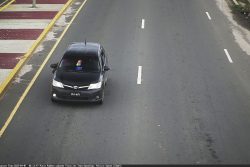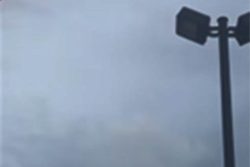It had been evident from the start of the nighttime curfews and the various other strictures aimed at garnering a measure of public restraint as a means of restricting the spread of the Coronavirus pandemic, that considerable numbers of people in communities all across the country, were indifferent to going down a road that would spread a restrictive canvass across their customary ways of life, not least, the manner in which they entertain themselves.
Back in earlier months of 2020 there were the distractions of the political impasse, which, insofar as large sections of the population were concerned, trumped the COVID-19 circumstance, never mind the fact that most of the rest of the world had long begun to treat the pandemic as a national emergency. There was a protracted period then when large numbers of people from communities across the country simply lived in the moment, refusing to be significantly distracted by COVID-19. What happened up until the political impasse finally came to an end was that the mix of official cautions and warnings had to compete with the prevailing (political) agenda for attention.
The public information initiatives emanating from government always seemed amateurish, lacking in the warranted sense of urgency. There was, too, the daily roll call of COVID-19 victims, the afflicted and the dead. Even those, however, were limited in their ‘purchase,’ lacking in their ability as effective attention-getters, failing, on the whole, to effect change by causing large swathes of the populace to easily surrender their accustomed way of life in exchange for strictures that had no foreseeable end.
COVID-19 raised other poignant issues too. The better off people are, materially, the better their chances of navigating their way through a crisis so that the level of emergency, varied from community to community, from family to family and from individual to individual. Here, one might add, for what it is worth and in in the context of the grass growing, horse starving adage, the wait that some communities, some families have had to endure to receive the state’s promised subsidy is, to tell the truth, altogether unacceptable.
Things have reached a point, in many instances where it has become difficult, often impossible, to reconcile accommodating the strictures associated with the pandemic with making a living. In essence COVID-19 punched holes in our social beings as much as it threatened our physical lives.
Up to beyond the middle of 2020 – and while the state had by then taken measures like the closure of schools and the exercise of monitored restraints to trade and commerce – the reality still appeared not to have caught on. There remained ‘the politics’ on the one hand and on the other, people’s determination to push back against the invasion of their privacy, their freedom. To that was added the new and formidable challenge of finding an adequate replacement for the seats-on-benches school system. Down the road our failure to find that option is certain to come back to haunt us, in some instances, in significant ways.
Indifference to the wearing of masks amongst large sections of the populace, well beyond the middle of 2020 was a dead giveaway. The ‘objectors’ had retreated into a kind of backs-to-the-wall open rebellion against what they saw as encumbrances, even restraints on their freedom. Up to that time masks were seen in some quarters as amounting to no more than the mimicking of an imported pattern that was probably limited in its effectiveness and which functioned like a kind of ‘big brother’ imposition that relieved us of the right not to have unwanted inconveniences imposed upon us.
In a society structured along the lives of large numbers of closely knit communities, the overwhelming majority of which are closely knit ones, the effective implementation of social distancing is bound to be nothing short of a nightmare; so that, in many communities social distancing was always likely to be upended by socio cultural considerations. For the people living in those communities keeping their distance from each other is by no means a habit to which they are accustomed…and when we add to that the early signs of blatant ineffectiveness in the execution of curfew-policing duties, efforts to nail down a robust countrywide culture of social distancing had been a non-starter from the ‘day one.’ That , indeed, may well be one of the key reasons for the continual spread of the pandemic.
Here it is not just a question of the recalcitrant, those who live mostly for their nocturnal hangouts but also the preponderance of the poor in those communities, for whom social distancing means detaching lifelines, their jobs.
In Guyana, there are instances in which what one might call ‘cultural habits’ and the imperative of fending off destitution are far more immediate survival-related considerations than social distancing. This is not a rant against being mindful of strictures. It is simply a fact of life.
It took quite a while, one recalls, after the police had been thrown into the curfew enforcement affray for their presence to ‘register’ with any meaningful measure of effectiveness. Perhaps it was the strangeness of the assignment that rendered the exercise ineffective for some time. Police patrols, in the first instances appeared indifferent, even indulgent. At any rate the villagers who were ‘knocking dominoes,’ imbibing, enjoying music blaring at a maddening decibel level and having ‘a whale of a time’ found it difficult to connect their ‘harmless’ pursuits with surviving or succumbing to some virus that had come to injure the pattern of their lives.
There are other issues here too…like what some people see as a blatant dichotomy between those places of entertainment that must remain wedded to the curfew hours and those which they say possess ‘political’ clearance to ‘carry on regardless.’ If this is indeed the case then the authorities cannot become too riled up when people call a spade a spade and when such double standards provoke pushbacks. To either allow or ignore such excesses in a circumstance such as ours makes a mockery of all of the various other initiatives that have been trotted out ostensibly to do what we can to try to keep the pandemic at bay.
It is the absence, in circumstances like these, of the principle of one law for all that frequently allows recalcitrance and resistance to fester. One senses that apart from being too incredulous to be true (after all not even the tense period that followed the March 2020 general elections had created cause for such restrictive extremes) it was the sense that the one law for all principle did not apply in the curfew circumstance that appeared, in large measure, to be held up as justification for other even more outrageous transgressions like last weekend’s Den Amstel ‘bashment’ where the police, seeking we are told to bring a curfew transgression to an end, had a tyre on a vehicle slashed, an act of unacceptable insurgency that justifies a heightening of the militancy with which the Force goes about ensuring that the COVID-19 restrictive protocols remain in place.
Truth be told COVID-19 poses an unprecedented crisis with a host of sub-plots for every strata of society. Three challenges come to mind. There is that ‘when will it end’ consideration that attaches ‘numbers’ to the victims, dead or stricken from the effects of the malady. Then there is the insidious impact of the pandemic on the transformations that take place in the various sectors of our economy and the attendant unfolding of survival-related pressures. No less deeply worrying is the guessing game that now actively ensues regarding just when we are going to be able to safely re-open our schools again and whether their continued closure up to this time is not pushing us deeper into an even darker hole of underdevelopment from which it might take us several generations to recover.
The argument has been made that it is far less the immediate impact, considerable though it continues to be, than the knock-on effect, that is the real nightmare; the point here is that we can tend our sick and bury our dead and perhaps find some vaccination that will eventually ‘see off’ COVID-19. That, however, is hardly the issue at this stage. The real issue is whether were are going to be able, after all is said and done, to resume a kind of ‘as you were’ posture as a society or whether, as a consequence of the visit which the pandemic has paid us, there are not going to be other Horsemen of the Apocalypse, social, and economic ones, that will come scavenging, seeking to pick on the ‘bones’ of what is left behind by COVID-19.








